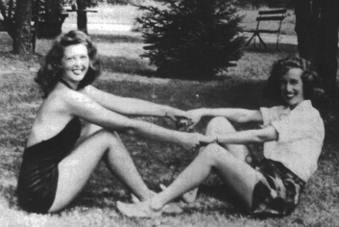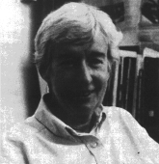




All of a sudden, you were just a play girl, but you knew there was a war going on. You were just as empty headed as everybody else.
When Kay Hearn walked into the room I first noticed her short gray hair and the casual way in which she was dressed. She was wearing no make-up or jewelry and had on a simple sweater and slacks. During the interview I realized that Kay was an assertive and independent person.
The choices for women were much more limited. I found that out by the time I was in the tenth grade. I don't know when girls find out what their limitations are now, if they think they have any now, or whether they need to ever think about it, but as far as my father was concerned, women should either be teachers, nurses, or secretaries. I certainly didn't want to be nurse, and I didn't want to be a teacher either. So I decided I'd take up bookkeeping and secretarial things. So that's what I did.
Kay began to tell me about her college life.
I started school in September 1941 and Pearl Harbor was in December 1941. Pretty soon the guys in ROTC (Reserve Officers' Training Corps) had to make decisions, I guess. I had a class in Washburn Hall upstairs where they had a long room that had tables in it. I think there were 45 or 55 people in the class Accounting I. By the time I got to Accounting II, there were only six students.
I went back as a sophomore and lived on campus. There was a half-term when there were lots of fellows around, but by the end of the second term, they were fewer and fewer. Adjustments were made all over the college in the courses that you could take and what you wanted to take. They sped up the courses so that we went summers. I went through in three years instead of four because I went two summers. I took one summer off and worked.
Kay also told me about campus life.
The only men left on campus had asthma or something that kept them out of the service, but it wasn't long before the college had army trainees. These army guys all moved into Eleanor Roosevelt Hall, which had been the freshman dorm. So now that was full of army guys and they were marching around campus, "Hut, two, three, four..." They were kept busy all the time, but they had weekends off. There was quite a lot of competition to get good dates.
Our house mother looked just like Eleanor Roosevelt, and she took her job seriously. Somehow or other she accused somebody in the house of sitting in a dark room with the curtain up looking at the dorm across and signaling over to it. That hadn't occurred to us, and we thought it must be her doing it! We used to have dances and invite -- oh, there was kind of a group from Narragansett Pier, Coast Guard boys, they were all pretty young, really. If you thought we were shy and inexperienced, the boys that came in were worse than us for being awkward.
Everybody had a romantic hero. We had Vaughn Monroe and we saw Tommy Dorsey and Glen Miller and all kinds of big band people. We'd go see them in Providence, Newport, the casino at Narragansett Pier, or Westerly. It was a great time for parties.
There were girls in school always writing letters. It depended on how many boyfriends you had, how many letters you wrote. We'd party as much as we could. There wasn't any gas, so we thumbed a lot and that was fun. If we were coming back to the dorm late, and somebody had picked us up, we'd have them stop at the wrong sorority so that we wouldn't let anybody know where we came from.
It delighted me to hear about all this fun, but there was of course, a sad side to Kay's college days. It seemed that she was losing friends to fight in the war, as fast as she was making them.
They'd come back in uniforms and then go off again. One nice kid that I knew, only a child, crashed in a flying accident in Colorado. It just seemed such a loss. He'd come out of a small town. He learned a whole lot. He was great, and then, all of a sudden, bang -- nothing. It was common for soldiers to bring a casket home of somebody. And the soldiers that brought it home didn't even know the person that was killed. There were some terrible times.
If I was living in that time, I don't think I'd really know if I thought the war was for a good cause.
No, I didn't like the war, but we were all victims of whatever propaganda or whatever the newspaper said. I think people know a whole lot more now than they did then. But Churchill and Roosevelt were pretty prominent figures. You really didn't question them the way we question leaders today, or the way we should question them. A lot of people thought that the war in the Pacific was unnecessary, but once you're in it, you can't do anything about it. Everything changed.
Even though a war ends, you still don't know much. You still don't know who's coming back and who isn't and how it will be.
Copyright 1995